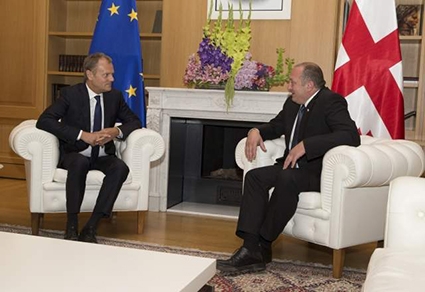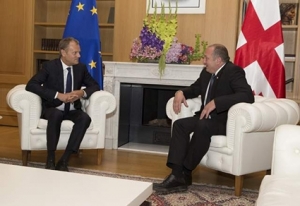European Council President Donald Tusk Conveys Key Messages to Georgia
This week Georgia hosted one of the top EU officials, Donald Tusk, President of the European Council, as he paid his first official visit to Georgia on July 20-21, in the frames of his South Caucasus trip to Armenia, Georgia and Azerbaijan. During the two days President Tusk met with top government officials and political leaders- President of Georgia Giorgi Margvelashvili, Prime Minister Irakli Garibashvili, and members of the Georgian government. He also took time to speak with the Georgian opposition and other Members of Parliament and addressed Georgian troops deployed under EU Operations in the Central African Republic.
The visit of the European Council President to Georgia comes at an important time, when tensions have grown at the administrative boundary line (ABL) after Russian occupational forces illegally placed signposts marking the so-called “state border” on the territory adjacent to the village of Tsitelubani of Gori municipality, and the village of Orchosani, occupied Akhalgori district, near Georgia’s main highway. After arriving at the conflict zone together with Kestutis Jankauskas, the Head of the European Union Monitoring Mission in Georgia (EUMM), President Tusk described the Russian actions as “provocative” and praised the Georgian government for reacting “responsibly” and “with cold blood” to manage this problem.
Another message Donald Tusk conveyed during his stay in the country was related to Georgia’s plans for a visa-free regime with the EU, anticipated in 2016. Initially, the country hoped the EU would liberalize travel with Georgia at the Eastern Partnership (EaP) summit in Riga this May, but the EU Member States then said that it was up to Georgia to set the pace to fulfil the necessary steps for such a decision. In this regard, the European Commission is expected to review Georgia’s performance in December 2015. Meanwhile, Tusk noted “good progress” has already been made and the sides have set a “clear and ambitious timetable to finalize the process,” adding that he personally has a “very strong political will” in favor of such a decision.
With regards to Georgia’s performance in the framework of the EaP, the EU policy framework which covers six post-communist states- Armenia, Azerbaijan, Georgia, Belarus, Moldova and Ukraine - Tusk said: “Georgia is definitely a front-runner,” adding, “this is not flattery. It is a fact.” The European Council President underlined that Georgia has defined itself as a close associated partner of the EU and the bilateral relations between the two sides are strong and growing. He added that the EU has “an ambitious plan” regarding the country.
Donald Tusk’s visit is an important political event, as he holds one of the top jobs in Europe. His elevation to the position of President of the European Council marked a coming of age for his native Poland, but also for the eastern European countries, which are determined to integrate into the EU. President Tusk has an extensive knowledge of the post-communist states and Russia. The only Polish Prime Minister to win a second term since the collapse of communism in 1989, Tusk inherited a Poland that was hostile to Official Moscow, and his endeavors later led the country to successful EU integration in 2004.
By definition, the President of the European Council is at the mercy of other European leaders. But Tusk’s personal support to Georgia is important, as the agenda-setting and mediation powers that go with the position allow him to shape the EU’s direction to a certain degree. In recent years, he has led the Europeans on getting tough with Vladimir Putin. Anticipating the Russian factor in the region during the two-day EaP summit this year, Donald Tusk said: “The Eastern Partnership isn’t a beauty contest between Russia and the EU…but let me be frank, beauty does count…if Russia was a bit softer, more charming, more attractive, perhaps it would not have to compensate its shortcomings by destructive, aggressive, and bullying tactics against its neighbors.”
Nini Japarashvili












